| |||||||||||||||||||
| |||||||||||||||||||
| |||||||||||||||||||
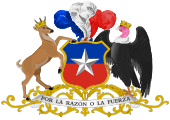 |
|---|
Presidential elections were held in Chile in 1906. [1] Conducted through a system of electors, they resulted in the election of Pedro Montt as President.
| |||||||||||||||||||
| |||||||||||||||||||
| |||||||||||||||||||
 |
|---|
Presidential elections were held in Chile in 1906. [1] Conducted through a system of electors, they resulted in the election of Pedro Montt as President.
| Candidate | Party | Votes | % | |
|---|---|---|---|---|
| Pedro Montt | Liberal Alliance | 164 | 62.60 | |
| Fernando Lazcano Echaurren | Coalition | 97 | 37.02 | |
| Zenón Torrealba | Democrat Party | 1 | 0.38 | |
| Total | 262 | 100.00 | ||
| Source: Chilean Elections Database | ||||

Chile, officially the Republic of Chile, is a country located in western South America. It is the southernmost country in the world and the closest to Antarctica, stretching along a narrow strip of land between the Andes Mountains and the Pacific Ocean. With an area of 756,102 square kilometers (291,933 sq mi) and a population of 17.5 million as of 2017, Chile shares borders with Peru to the north, Bolivia to the northeast, Argentina to the east, and the Drake Passage to the south. The country also controls several Pacific islands, including Juan Fernández, Isla Salas y Gómez, Desventuradas, and Easter Island, and claims about 1,250,000 square kilometers (480,000 sq mi) of Antarctica as the Chilean Antarctic Territory. The capital and largest city of Chile is Santiago, and the national language is Spanish.

Chile's government is a representative democratic republic, whereby the President of Chile is both head of state and head of government, and of a formal multi-party system. Executive power is exercised by the president and by their cabinet. Legislative power is vested in both the government and the two chambers of the National Congress. The judiciary is independent of the executive and the legislature of Chile.

The Independent Democratic Union is a conservative and right-wing political party in Chile, founded in 1983. Its founder was the lawyer, politician and law professor Jaime Guzmán, a civilian allied with Augusto Pinochet. Guzmán was a senator from 1990 until his murder by communist guerrillas on April 1, 1991.

Manuel Francisco Antonio Julián Montt Torres was a Chilean statesman and scholar. He was twice elected President of Chile between 1851 and 1861.

Pedro Abelino Aguirre Cerda was a Chilean political figure, educator, and lawyer who served as the 22nd president of Chile from 1938 until his death in 1941. A member of the Radical Party since 1906, he was chosen by the left-wing Popular Front coalition as its candidate for the 1938 presidential election and won. He had previously served as deputy for San Felipe, Putaendo and Los Andes from 1915 to 1918, Minister of the Interior from January to September 1918 under president Juan Luis Sanfuentes, deputy for Santiago from 1918 to 1921, Minister of Justice and Public Instruction from 1920 to 1921 under president Arturo Alessandri, and senator for Concepción from 1921 to 1927. He died two years and eleven months into his presidency on November 25, 1941, at the age of 62, from tuberculosis.
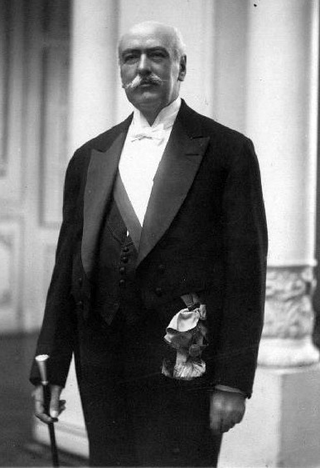
Juan Luis Sanfuentes Andonaegui was President of Chile between 1915 and 1920.

Aniceto Arce Ruiz de Mendoza was a Bolivian lawyer and politician who served as the 22nd president of Bolivia from 1888 to 1892. He also served as the fourth vice president of Bolivia from 1880 to 1881 under Narciso Campero. The Aniceto Arce Province is named after him.
The Liberal Party was a Chilean political party created by a faction of pipiolos in 1849. After the conservative victory in the Chilean Civil War of 1829 the liberals became the principal opposition party to the Conservative Party. During the Liberal Party's early history one of its main goal was to create a new constitution to replace the Chilean Constitution of 1833. Rigged election helped to prevent the Liberal Party's presidential candidates to be elected until 1861, during that time elements of the liberal party made attempts to overthrow the government, these were the Revolution of 1851 and the Revolution of 1859. These failed insurrections led many liberals to emigrate, among them Benjamín Vicuña Mackenna. In 1863 a group of liberal split off to form the Radical Party which would hold power from 1938 to 1952. Originally an anticlericalist party that championed classical liberalism, the liberals later became a right-wing party.

The Radical Party was a Chilean political party. It was formed in 1863 in Copiapó by a split in the Liberal Party. Not coincidentally, it was formed shortly after the organization of the Grand Lodge of Chile, and it has maintained a close relationship with Chilean Freemasonry throughout its life. As such, it represented the anticlericalist position in Chilean politics, and was instrumental in producing the "theological reforms" in Chilean law in the early 1880s. These laws removed the cemeteries from the control of the Roman Catholic Church, established a civil registry of births and death in place of the previous recordkeeping of the church, and established a civil law of matrimony, which removed the determination of validity of marriages from the church. Prior to these laws, it was impossible for non-Catholics to contract marriage in Chile, and meant that any children they produced were illegitimate. Non-Catholics had also been barred from burial in Catholic cemeteries, which were virtually the only cemeteries in the country; instead, non-Catholics were buried in the beaches, and even on the Santa Lucia Hill in Santiago, which, in the 19th century, functioned as Santiago's dump.

The Parliamentary Era in Chile began in 1891, at the end of the Civil War, and spanned until 1925 and the establishment of the 1925 Constitution. Also called "pseudo-parliamentary" period or "Parliamentary Republic", this period was thus named because it established a quasi-parliamentary system based on the interpretation of the 1833 Constitution following the defeat of President José Manuel Balmaceda during the Civil War. As opposed to a "true parliamentary" system, the executive was not subject to the legislative power but checks and balances of executive over the legislature were weakened. The President remained the head of state but its powers and control of the government were reduced. The Parliamentary Republic lasted until the 1925 Constitution drafted by President Arturo Alessandri and his minister José Maza. The new Constitution created a presidential system, which lasted, with several modifications, until the 1973 coup d'état.
The Liberal Democratic Party, also called Balmacedists, was a liberal party in Chile. It was one of the main actors of the Chilean parliamentary system from 1891 to 1925.
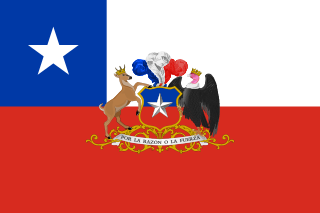
The president of Chile, officially known as the president of the Republic of Chile, is the head of state and head of government of the Republic of Chile. The president is responsible for both government administration and state administration. Although its role and significance have changed over time, and its position and relations with other actors in the national political organization have also evolved, it remains one of the most prominent political offices in the country. It is also considered one of the key institutions that form the "Historic Constitution of Chile," and is crucial to the country's political stability.
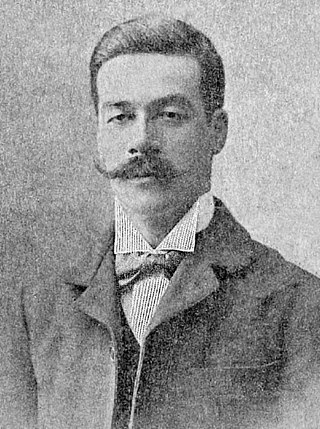
Luis Emilio Recabarren Serrano was a Chilean political figure. He was elected several times as deputy, and was the driving force behind the worker's movement in Chile.
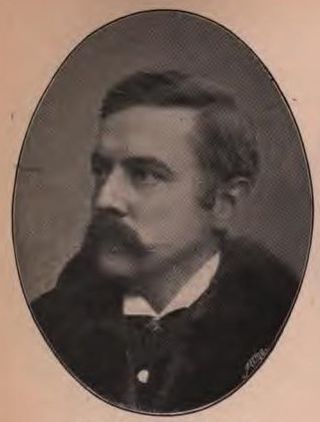
Vicary Gibbs was a British barrister, merchant and Conservative Party politician. He sat in the House of Commons from 1892 to 1904. He lost his seat after his business created a conflict of interest. He was the editor of the early volumes of The Complete Peerage.
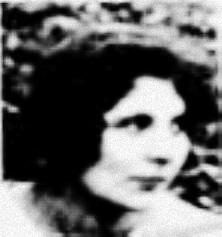
Olga Maturana Espinosa was a Chilean politician born in Santiago. Maturana worked as Councillor of Pichilemu in 1950, and became the first female Mayor of Pichilemu in 1951.

The 1906 Valparaíso earthquake hit Valparaíso, Chile, on August 16 at 19:55 local time. Its epicenter was offshore from the Valparaíso Region, and its intensity was estimated at magnitude 8.2 Mw. This earthquake occurred thirty minutes after the 1906 Aleutian Islands earthquake.
The Grand Lodge of Chile is a regular Masonic body in Chile founded on May 24, 1862. The earthquake of 1906 destroyed the original headquarters and the archives of the Grand Lodge, which determined its definitive transfer to Santiago, settling in the Club de la República.

The Democrat Party of Chile was a Chilean political party created by a left-wing faction of the Radical Party in 1887. It was created to protect the working and middle class, but over the years it became a traditional political movement, with factions of center-right and center-left.
The following lists events that happened during 1906 in Chile.